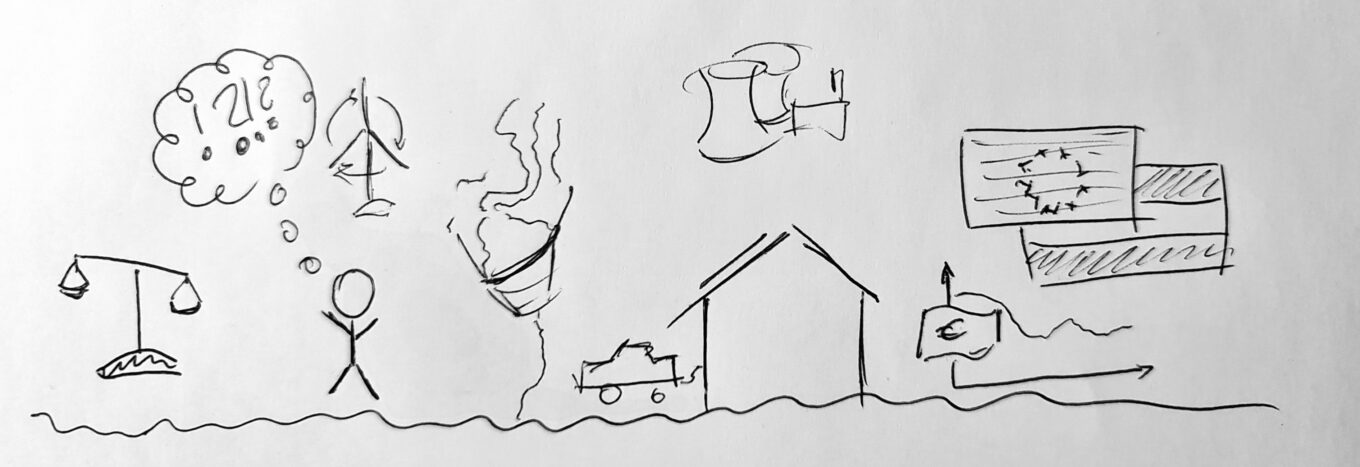Raison d’être for this blog
Dear Reader,
You are reading the first issue of our blog on energy data management, smart grids, energy transition and innovation&change mangement. With my background in Technical Informatics, Project Management and Enterprise Architecture, I had the opportunity in the last 20 years, to deep dive into systems engineering disciplines related to event management, insurance technology, physical and financial wholesale trading, smart electricity grid management, electricity&gas smart metering and legislation.
In the previous 10+ years, I had the opportunity to dig into a variety of aspects with regards to the Energy Transition and Energy System digitalisation, from architecting centralised solutions for large-scale international wholesale energy trading, finance, risk management and compliance to travelling and consulting a multiplicity of Forbes 100 energy companies and elaborating cross-disciplinary digitalised solutions to cope with an ever-and-always-faster changing energy system environment. With Hamburg-based software development company Ponton GmbH [1] and in close co-coperation with EFET – the European Federation of Energy Traders – [2], former EFETnet now Equias [3], and other trading entities and associations, I had the opportunity to work and live through developments and regulatory efforts not only on the side of the ones that are the primary subject to regulation, but also gather invaluable experience of positive side-effects that initiatives like EMIR [4], REMIT [5], FMIA [6], Dodd-Frank [7] and others may develop. Having to report your activities to a regulator in a common, formalised and standardised markup language (like the CPML – Commodity Products Markup Language [8]) forces actors to reflect on their own terminology and processes and leads to better interoperability and comparability. However, in my years as a travelling consultant doing digitalisation and transition projects in many European countries I witnessed first-hand that it is often a very costly, risky and often painful exercise to get to that point. Transitions lead to conflicts and demanding project environments.
I am infinitely grateful for the opportunity to make these experiences and acquaintances with so many diverse and outstanding characters and all the colleagues that I had the honour to work with throughout these years. However, through our involvement in the blockchain hype (Ponton was leading the Enerchain [9] initiative, I was co-ordinating GridChain [10] research project by Austrian distribution system operators), we had the opportunity and the need to look at Energy data and grid management, asset integration and markets from a distributed, bottoms-up perspective, with active customers at the centre. Through these activities – mainly for Oesterreichs Energie [11](Austrian Energy Association) and Energy Data Exchange Austria (EDA GmbH) [12] – I was nominated by OE and GEODE – The voice of local energy distributors in Europe [13] to the work in European Commission’s EU Smart Grids Task Force [14] to work on the question “how to facilitate the full operability of energy services within the Union”, as demanded by Article 24 of Directive (EU) 2019/944 of the European Parliament and of the Council of 5 June 2019 on common rules for the internal market for electricity [15]. Together with experts and representatives from a variety of stakeholder associations (European Commission’s DG ENER, DG CONNECT and DG JUST, customers, distribution and transmission system operators, regulators, smart grids tool vendors, reps of smart energy system actors, amongst others), we have elaborated an extensive strategy and coined the most important principles of such an effort, culminating in 2019 report Towards Interoperability within the EU for Electricity and Gas Data Formats and Procedures [16].
Since the beginning of 2020 we are working on drafts for Implementing Acts sketching an EU strategy and to a consistent approach to make energy services comparable and interoperable across the union. Now, this is very challenging, as markets and market communication environments have developed very different characteristics and architectures since the beginning of energy market liberalisation end of the 1990s. We have seen Member States going for centralised systems (a.k.a. National Energy Data Hubs), and others following a more distributed data-stays-as-close-to-the-source-as-possible direction. In Austria, we follow a highly standardised, distributed message-based market communication architecture (EDA, based on AS4 standard [17]), where data is only exchanged within the context of clearly defined business processes. Even others follow hybrid approaches. Now, as diverse they might be – all these infrastructures have one thing in common: they have been developed following susidiary national strategies. Energy market data management is – following Article 23 of Directive (EU) 2019/944 – a subsidiarily national competency, and changing this would lead to a lot of side effects, stranded investments and resistence. Therefore, a European approach to interoperability of energy services must take the European principle of subsidiarity into account. I will use this blog to cover and explain some of these aspects in detail to start discussions and disseminate findings – also to have them challenged – so I am more than happy if you use the commenting function for this, please.
Another topic that we are working on and that becomes more and more important, is the accessibility of near real-time data at a European scale (as facilitated by Articles 19 and 20 of Directive (EU) 2019/944), seen liberated for national or regional goggles, enabling smarter services like Energy Communities at their full potential and smart charging solutions. All too often, solution providers are not aware of the potential enabled by existing infrastructure and legislation already now – so in this blog I will try to point you to respective developments.
As a last point, we have initiated Project EDDIE – a European Distributed Data Infrastructure for Energy [], wrote a project proposal together with 5 highly renowned European research institutions, system development providers, data-sharing infrastructures and think tanks to make that data, and also data for Distributed Flexibility, Supplier Switching, Billing, and other services (like e.g. Energy Communities or Change of Balancing Responsible Party). Based on EDDIE as a wider initiative, we will tackle pressing topics with Open Source solutions with the expertise we generate in our legislative and expert group activities. In this blog, I will also report on developments in that sector.
Most importantly, the reason for this blog is that we are living in a very complex environment and the truth and “good or bad” are not always self-evident. Therefore, this blog is meant to be a forum, meaning that I am more than happy if you express your critical opinions and use the commenting option freely. Also, it is important that the opinions expressed on this website are following my personal conviction, which I am prepared to change and adapt based on your feedback, so I see this blog first and foremost as an opportunity to learn.
Yours sincerely,

References
[1] Ponton GmbH, Hamburg: https://www.ponton.de
[2] EFET – European Federation of Energy Traders: https://www.efet.org
[3] Equias – essential fintech for Europe’s energy traders: https://www.equias.org
[4] EMIR – Regulation (EU) No 648/2012 of the European Parliament and of the Council of 4 July 2012 on OTC derivatives, central counterparties and trade repositories Text with EEA relevance: [open legislation in EUR-LEX]
[5] REMIT – Regulation (EU) No 1227/2011 of the European Parliament and of the Council of 25 October 2011 on wholesale energy market integrity and transparency Text with EEA relevance: [open legislation in EUR-LEX]
[6] Swiss Financial Markets Infrastructure Act (FMIA): [open in Fedlex (admin.ch)]
[7] US Dodd-Frank Act: [Dodd-Frank Act | CFTC]
[8] CPML – Commodity Products Markup Language: [CpML.org]
[9] EnerChain: https://enerchain.ponton.de
[10] GridChain: https://enerchain.ponton.de/index.php/16-gridchain-blockchain-based-process-integration-for-the-smart-grids-of-the-future
[11] Oesterreichs Energie: https://oesterreichsenergie.at
[12] Energy Data Exchange Austria (EDA GmbH): https://www.eda.at
[13] GEODE – The voice of local energy distributors in Europe: https://www.geode-eu.org
[15] Directive (EU) 2019/944 – [open legislation in EUR-LEX]
[16] EG1 Report “Towards Interoperability within the EU for Electricity and Gas Data Formats and Procedures”
[17] OASIS AS4 Standard:
[18] EDDIE – European Distributed Data Infrastructure for Energy: https://eddie.energy



